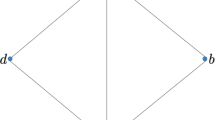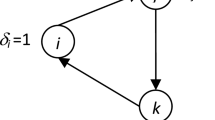Abstract
This paper proposes an algorithm to reason on constraints expressed in terms of polynomials with integer coefficients whose variables take values from finite subsets of the integers. The proposed algorithm assumes that an initial approximation of the domains of variables is available in terms of a bounding box, and it recursively subdivides the box into disjoint boxes until a termination condition is met. The algorithm includes three termination conditions that allow using it for three related reasoning tasks: constraint satisfaction, enumeration of solutions, and hyper-arc consistency enforcement. Considered termination conditions are based on suitable lower and upper bounds for polynomial functions over boxes that are determined using new results proved in the paper. The algorithm is particularly appropriate to reason on high-degree polynomial constraints because the proposed method to determine lower and upper bounds can outperform alternative methods when high-degree polynomials in a moderate number of variables are considered.
Similar content being viewed by others
References
Apt, K.: Principles of Constraint Programming. Cambridge University Press, Cambridge (2003)
Bergenti, F., Monica, S.: Hyper-arc consistency of polynomial constraints over finite domains using the modified Bernstein form. Ann. Math. Artif. Intell. 80(2), 131–151 (2017)
Bergenti, F., Monica, S.: Satisfaction of polynomial constraints over finite domains using function values. In: Della Monica, D., Murano, A., Rubin, S., Sauro, L. (eds.) Joint Proceedings of the 18th Italian Conference on Theoretical Computer Science and the 32nd Italian Conference on Computational Logic (ICTCS 2017 and CILC 2017), CEUR Workshop Proceedings, vol. 1949, pp 262–275. RWTH Aachen (2017)
Bergenti, F., Monica, S.: Simple and effective sign consistency using interval arithmetic. In: Casagrande, A., Omodeo, E.G. (eds.) Proceedings of the 34th Italian Conference on Computational Logic (CILC 2019), CEUR Workshop Proceedings, vol. 2396, pp 89–103. RWTH Aachen (2019)
Bergenti, F., Monica, S., Rossi, G.: Polynomial constraint solving over finite domains with the modified Bernstein form. In: Fiorentini, C., Momigliano, A. (eds.) Proceedings of the 31st Italian Conference on Computational Logic (CILC 2016), CEUR Workshop Proceedings, vol. 1645, pp 118–131. RWTH Aachen (2016)
Bergenti, F., Monica, S., Rossi, G.: A subdivision approach to the solution of polynomial constraints over finite domains using the modified Bernstein form. In: Adorni, G., Cagnoni, S., Gori, M., Maratea, M. (eds.) AI*IA 2016 Advances in Artificial Intelligence, Lecture Notes in Computer Science, vol. 10037, pp 179–191. Springer International Publishing (2016)
Bergenti, F., Monica, S., Rossi, G.: Constraint logic programming with polynomial constraints over finite domains. Fundamenta Informaticae 161(1–2), 9–27 (2018)
Bhansali, S., Kramer, G.A., Hoar, T.J.: A principled approach towards symbolic geometric constraint satisfaction. J. Artif. Intell. Res. 4, 419–443 (1996)
Farouki, R.T.: The Bernstein polynomial basis: A centennial retrospective. Comput.-Aided Geom. Des. 29(6), 379–419 (2012)
Farouki, R.T., Rajan, V.T.: Algorithms for polynomials in Bernstein form. Comput.-Aided Geom. Des. 5(1), 1–26 (1988)
Garloff, J.: Convergent bounds for the range of multivariate polynomials. In: Nickel, K. (ed.) Interval Mathematics 1985, Lecture Notes in Computer Science, vol. 212, pp 37–56. Springer International Publishing (1986)
Garloff, J., Smith, A.P.: Solution of systems of polynomial equations by using Bernstein expansion. In: Alefeld, G., Rohn, J., Rump, S., Yamamoto, T. (eds.) Symbolic Algebraic Methods and Verification Methods, pp 87–97. Springer International Publishing (2001)
Grimstad, B., Sandnes, A.: Global optimization with spline constraints: A new branch-and-bound method based on B-splines. J. Glob. Optim. 65(3), 401–439 (2016)
Lorentz, G.G.: Bernstein Polynomials. University of Toronto Press, Toronto (1953)
Malapert, A., Régin, J.C., Rezgui, M.: Embarrassingly parallel search in constraint programming. J. Artif. Intell. Res. 57, 421–464 (2016)
Mourrain, B., Pavone, J.: Subdivision methods for solving polynomial equations. J. Symb. Comput. 44(3), 292–306 (2009)
Nataraj, P., Arounassalame, M.: A new subdivision algorithm for the Bernstein polynomial approach to global optimization. Int. J. Autom. Comput. 4(4), 342–352 (2007)
Peña, J. M., Sauer, T.: On the multivariate Horner scheme. SIAM J. Numer. Anal. 37(4), 1186–1197 (2000)
Ray, S., Nataraj, P.: An efficient algorithm for range computation of polynomials using the Bernstein form. J. Glob. Optim. 45, 403–426 (2009)
Ray, S., Nataraj, P.: A matrix method for efficient computation of Bernstein coefficients. Reliab. Comput. 17, 40–71 (2012)
Rivlin, T.J.: Bounds on a polynomial. J. Res. Natl. Bur. Stand. 74B(1), 47–54 (1970)
Rossi, F., van Beek, P., Walsh, T.: Handbook of Constraint Programming. Elsevier, New York (2006)
Sánchez-Reyes, J.: Algebraic manipulation in the Bernstein form made simple via convolutions. Comput. Aided Des. 35, 959–967 (2003)
Smith, A.P.: Fast construction of constant bound functions for sparse polynomials. J. Glob. Optim. 43(2), 445–458 (2009)
Steffens, K.G.: The History of Approximation Theory: From Euler to Bernstein. Birkhäuser, Boston (2006)
Titi, J., Garloff, J.: Matrix methods for the tensorial Bernstein form. Appl. Math. Comput. 346, 254–271 (2019)
Triska, M.: The finite domain constraint solver of SWI-Prolog. In: Schrijvers, T., Thiemann, P. (eds.) Functional and Logic Programming, Lecture Notes in Computer Science, vol. 7294, pp 307–316. Springer International Publishing (2012)
Wielemaker, J., Schrijvers, T., Triska, M., Lager, T.: SWI-Prolog. Theory Practice Logic Program. 12(1–2), 67–96 (2012)
Author information
Authors and Affiliations
Corresponding author
Additional information
Publisher’s note
Springer Nature remains neutral with regard to jurisdictional claims in published maps and institutional affiliations.
Rights and permissions
About this article
Cite this article
Bergenti, F., Monica, S. A subdivision algorithm to reason on high-degree polynomial constraints over finite domains. Ann Math Artif Intell 87, 343–360 (2019). https://doi.org/10.1007/s10472-019-09680-4
Published:
Issue Date:
DOI: https://doi.org/10.1007/s10472-019-09680-4
Keywords
- High-degree polynomial constraints
- Polynomial constraints over finite domains
- Constraint satisfaction problems




